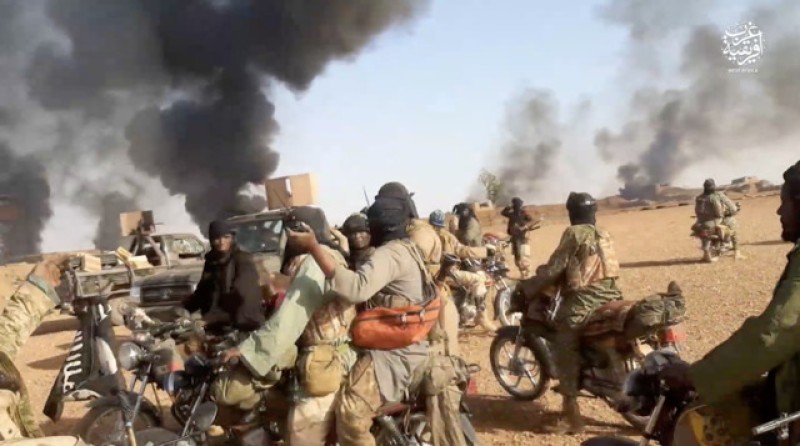"The U.S. took this step based on evidence showing that these Malian officials have contributed to the Wagner Group's malicious activities in Mali," said the U.S. Department of the Treasury's Office of Foreign Assets Control (OFAC).
The sanctions have been imposed on Mali's Defense Minister, Colonel Sadio Camara; the Chief of Staff of the country's Air Force, Colonel Alou Boi Diarra; and the Malian Air Force Deputy Chief of Staff, Lieutenant Colonel Adama Bagayoko.
OFAC said that Minister Camara planned and set up the deployment of the Wagner Group in Mali, while Colonel Diarra, serving as Air Logistics Chief, provided substantial assistance to the logistical movement of Russian organizations in the country.
"Together, Camara and Diarra formulated and executed the plan that ultimately ushered the Wagner Group into Mali," the statement said. It also mentioned that the two officials often traveled to Russia to finalize the deployment agreement between the Wagner Group and the Malian transition government.
OFAC further stated that Diarra is a Wagner Group booster within the Malian Armed Forces and collaborated with Ivan Aleksandrovich Maslov, the Wagner Group's U.S.-sanctioned leader in Mali.
Lieutenant Colonel Bagayoko has been lobbing for the Wagner Group in the Burkinabe transition administration and trying to ensure the group's deployment to Burkina Faso, while allegedly also facilitating the mercenary group's access to gold mining in Mali.
According to Under Secretary of the Treasury for Terrorism and Financial Intelligence Brian E. Nelson, these sanctions exposed "the principal Malian officials who have been instrumental in facilitating the Wagner Group's entrenchment in Mali over the past two years," consequently making the people of Mali "vulnerable to the Wagner Group's destabilizing activities and human rights abuses."
The designated Malian officials were also "paving the way for the exploitation of their country's sovereign resources to the benefit of the Wagner Group's operations in Ukraine," Nelson said.
Since 2017, the U.S. government has sanctioned the mercenary Wagner Group multiple times for various atrocities in Ukraine, the Central African Republic, and Mali.
OFAC emphasized that since Wagner entered Mali in December 2021, the number of civilian casualties in the African nation has increased by 278 percent, with many civilian deaths caused by operations carried out by Malian Armed Forces alongside Wagner Group mercenaries.
On June 27, six U.S. government agencies published a business risk advisory regarding the Sub-Saharan African gold industry, highlighting concerns about the Wagner Group's gold exploitation and profiteering in Mali and other nations.
Human Rights Watch (HRW) also issued a warning on Monday, claiming that Malian armed forces and foreign fighters linked to the Wagner mercenaries had arbitrarily killed and forcefully detained several dozen people in Mali's central region since December 2022.
"They also destroyed and looted civilian property and allegedly tortured detainees in an army camp," claimed the global human rights watchdog.
According to HRW's 2023 World Report, human rights conditions in Mali have severely worsened in 2022, with an increasing number of attacks on civilians by Islamist armed groups and executions of suspects by pro-government troops during counterterrorism operations.
The report emphasized that the Malian government was increasingly cracking down on media and opposition voices, narrowing civic space, and that the growing abuses occurred against the backdrop of an ongoing political crisis and significant tension with Mali's diplomatic partners, stemming from the country's decision to hire the Wagner Group.
"The engagement of the Wagner Group, and the mounting allegations of summary executions and other abuses by them, intensified tensions with other military partners, particularly France, which ended a decade-long military operation in Mali in August [2022]. Likewise, Mali's relationship with the United Nations and neighboring West African countries deteriorated throughout the year, increasing Mali's political isolation," HRW's report warned.
The watchdog also reminded that on June 16, 2023, Malian Foreign Minister Abdoulaye Diop called on the United Nations Security Council to withdraw the U.N. Multidimensional Integrated Stabilization Mission in Mali (MINUSMA) "without delay," citing a "crisis of confidence" between Malian authorities and the 15,000-strong U.N. peacekeeping force in that country.
Two weeks later, the U.N. Security Council unanimously authorized the withdrawal of all U.N. peacekeeping troops from Mali, where they were deployed in 2013 following a coup in the country in 2012.
A number of Council members, however, expressed concern that the pullout is taking place during a moment of instability in the Sahel area.
Reflecting such worries, U.S. Ambassador Jeffrey DeLaurentis stated that all efforts should be taken to resolve issues such as the presence of armed players, such as the Wagner Group.
While many Council members acknowledged that the mission's withdrawal did not mean the end of international aid to Mali, Russia's Deputy Ambassador Anna Evstigneeva noted that Moscow will continue to provide assistance to the African country no matter what.



